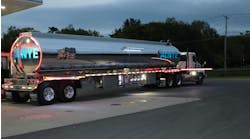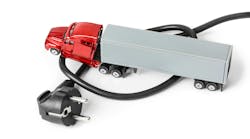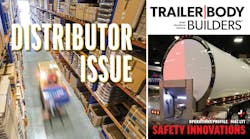NORTH ROYALTON, Ohio— About 30 minutes from Cleveland, not far from the junction of Interstates 71 and 80, sits Transport Services, Inc., a 46-acre trailer dealership that fits in perfectly with the surrounding light industrial area. The 48-year-old business, an authorized Hyundai Translead and Cheetah Chassis dealer, is flanked by storage and landscaping businesses, and the long two-story building’s exterior shares the same non-descript look.
But that’s just a façade. Inside, TSI has been modernized to meet the present and future needs of fleets through a series of renovations to improve the offices, parts, and maintenance areas. Every detail seems thought out for the company’s two most pressing goals: to better serve customers and entice the best technicians.
You notice it right away upon entering the building and walking over the lustrous vinyl planks to the maroon, silver, and black reception counter. Behind the narrow Corian countertop, renderings of the dealer’s new Toledo branch, planned for March 2025, rest on easels, a sign of TSI’s growth plan. The dealer also has a location in Columbus, Ohio.
Against the adjacent wall are two aluminum Aviator-style leather chairs, the sort of high-end detail to show the owners value traditional American industrialism and their visitors’ comfort.
Above those are the dealers’ four pillars (technically glass signs) that hold up the business—leasing, sales, service, and parts. Though not load-bearing, these pillars hold up the business in good times and bad, according to company president Adam Therrien, who invited us to visit the site in June. His father Albert founded the company in 1976 and remains CEO.
“These four divisions position us to uniquely handle our customers’ trailer needs, starting before the purchase or lease is made through the life of the trailer,” Therrien explained. “We are not looking for a one-and-done transaction; rather we are looking to establish long-term partnerships with our customers.”
This has allowed TSI to keep customers not just through one purchase, but the life of their fleet.
And to ensure that longevity, TSI continually invests in the facility, with a major overhaul in 2017 and additional expansion in 2023.
For the employees, the entire second floor, previously office space, was reconstituted as a mid-day oasis from the daily grind. Updates included a swole employee gym with equipment and a dining area dressed like a hip brewpub. The secondary kitchenette alone is bigger than the previous breakroom. While before workers would have to cram into a shared break space, now they can escape to one of three private rooms adjacent to the dining area, each with a comfy recliner and big-screen TV.
The two sides fit together like a tractor and trailer. And with all commercial vehicle techs hard to come by, let alone those who specialize on the back end, TSI’s leadership knows going the extra mile will help ensure the shop can attract and keep the right talent to grow the business.
“It starts with techs—if you don’t have techs to fix your equipment, there’s nowhere to go,” asserted Therrien, who as a teenager worked in the shop over summer breaks. “They’re as important as anybody else in this organization.”
During freight downturns, which the industry is just starting to crawl out of, the maintenance side keeps revenue steadily coming in when sales and leasing dip. And customers need more of their services when they are not able to buy newer trailers.
“Customers who normally are keeping their tractor and trailers longer are going to need service more often,” Therrien offered.
This location alone has 22 bays, four added in 2017 and another six in 2023, while Columbus has seven trailer bays and a three-bay full body and paint shop. Both sites can maintain, repair, and rebuild trailers of all makes and have 11 mobile maintenance trucks to provide services off-site. Each location employs at least 15 technicians.
To show women at TSI are just as valued as the men, TSI also added a female-specific locker room with its own showers. He cited women’s different approaches to problems and generally high attention to detail make them great assets for the industry.
“There’s not enough of them, truthfully, be it technicians, drivers, office folks, whoever—and I think our industry could use a lot more,” he said.
TSI was named a best place to work by Women in Trucking in 2020, though Therrien takes more pride in building a place where his two daughters could someday work and “feel completely comfortable.”
Upholding relationships
The conference room we met in exudes that level of permanence, from the grandiose mahogany table fit for a Fortune 500 company boardroom to the walls lined with pictures of Cleveland’s art deco colossuses, the Guardians of Traffic (from which the former Cleveland Indians took their new name in 2021). It’s the kind of place where you feel leadership knows where they came from and expect to be for a long time.
Therrien explained it all comes down to relationships. Fleet customers have gone from sticking with dealers out of loyalty to staying with them until they let them down. That doesn’t mean making one mistake, but more how they respond to mishaps and miscommunication.
“We need to have the strongest relationship with our customers, ultimately, because we’re going to screw up,” Adam explained. And TSI wants customers to tell them how they screwed up so they can quickly find ways to make it right.
Read more: ‘Braking’ new ground with trailer innovation
This relationship often starts with one of the 15 salespeople serving the Buckeye State and surrounding regions (Toledo will reach up to Detroit and over to Fort Wayne, Indiana), who basically cold-call prospective fleets.
“They go knock on doors and learn what customers need, and I believe that’s what builds the relationship that ultimately can lead to opportunities,” Therrien said.
But to keep a customer long-term, TSI must ensure maximum uptime. And that’s proved in the bay.
Expanding maintenance
TSI knows a dealer can’t very well stake its reputation on service if it can’t deliver, no matter how nice the lobby or meeting room is. That meant ensuring the shop has everything it needs.
Along with adding and widening bays, TSI added a 10,000-sq.-ft. parts warehouse that increased inventory and ultimately, uptime. Fresh paint on the walls brightened up the place, and an outdoor patio invited employees to get out in the sunshine. Enhanced lighting and more security cameras throughout the complex also ensured a higher level of safety and security.
For their occupational safety, scissor lifts replaced ladders in the shop. To avoid a tech troubleshooting a wire harness issue for five or more hours, the shop also invested in ABS and lighting diagnostic tools, which Therrien said “has helped us tremendously get to the root of the cause quickly and more efficiently.”
“When technicians come to us and see our facility, we try to be better than most for safety purposes and for available tools,” Therrien said. “Because ultimately, it makes your life easier. Efficiency is better and they see that we care, so they’re more engaged.”
Getting these new tools was crucial to uptime, as Ray Erne, service operations manager at the shop, noted even skilled techs have issues with electrical troubleshooting. The tools, though, are meaningless if the techs aren’t properly trained to use them.
And if that shop has staffing trouble or improperly trained techs, screw-ups will ensue. That makes the retention of good techs even more important.
Training the next generation
Therrien noted in general that TSI can set itself apart through its training program: Smaller fleets and independent shops don’t always have techs trained to work on modern trailers, which are getting smarter by the day with more electrical components. And many small shops still struggle with decades-old mechanical technology.
“Recently, we had the ability to put some air disc brakes into a customer’s trailer and they declined,” he recalled. “They would rather run the older drums. Their main driver was not every repair facility knows how to maintain or fix the disc brakes.
“There is unfortunately an aging of our technicians in the industry, and they have been used to one thing and if they’re not willing to be trained, or learn, that’s a problem,” Therrien continued.
TSI has a robust apprentice program and often recruits from technical and secondary schools. Many of those new techs have more training on the diesel side, so the shop has to convince them “that diesel techs can be great trailer techs,” Therrien said.
To make sure students at one Columbus vo-tech school has more practical knowledge of the sector, TSI is planning to donate a trailer to them.
Therrien added that getting them from schools as opposed to other shops allows TSI to train them to their standards without having to unlearn potential bad habits.
Erne noted many have “minimal skills” at the start, so the shop cross-trains them for one to three weeks with each of the more experienced techs “until [they’ve] learned every skill out there.” This “completely change[d] our turnaround time for our customers,” he continued.
During our visit, one of the newer techs, Dylan Greve, formally trained as a welder with “zero experience” in the sector before TSI, was learning about wheel-end maintenance from technical advisor Mike Conley, who had as much experience in the industry as Greve had years on earth—25.
The continual pairing of new and old technicians has apparently improved the environment even more than all the facility upgrades.
“We have a very cohesive culture,” Conley offered. “Everybody wants to see each other succeed. We help each other out. It’s one of the best shops I’ve worked in.”
Columbus also employs this model and even brought in 20 graduating high schoolers for a tour earlier this year. They got one lead for a potential hire, which made the time spent on the visit worth it, according to Therrien.
That cross-training also extends up to the C-Suite.
“A lot of our top C-level execs were not truck folks,” Therrien said. “We don’t have a lot of retreads of folks who have been in the industry for many, many years going from one dealership to the next.”
The HR manager, for example, comes from the IT world. TSI has no mandates on prior trailer experience, but they do require all new hires to be technologically savvy, Therrien said. By constantly refreshing and expanding its facilities, not only the building but the perspectives of those within, TSI is ready to change with the times, as trailers get smarter and customers expect more for less.
“I like bringing in personnel from different industries because some are light years ahead of the trailer industry when it comes to technology,” Therrien concluded. “If they’re already used to it, and we bring it in, or we bring it along, that’s going to be better for us as an organization.”















